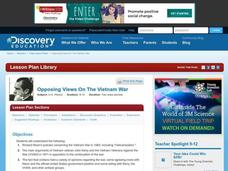Smithsonian Institution
The Soldier’s Experience—Vietnam versus World War I
The Vietnam War and World War I were two very important—and different—wars. To understand the differences, and similarities, class members watch videos, examine primary source documents, and then create a newscast that examines the...
Curated OER
Anti-Vietnam War Movement Lesson
Students examine reasons why many Americans opposed the Vietnam War. In this world history lesson, students view a Powerpoint of anti-war images and a timeline of events that led to the war. Students examine speeches made by John Kerry...
Curated OER
Opposing Views on the Vietnam War
Students consider opinions regarding the Vietnam War. In this Vietnam lesson plan, students compare Nixon and Johnson's policies about the war. Students also research the anti-war movements as well as the sentiments of the those how...
Curated OER
Historical Comparison of Anti-War Music
Students explain that, how in this world of increasing awareness and interdependence, music can act as a magnet to draw people together. They research and compare anti-war songs from many different generations.
Curated OER
The Tet Offensive and the Vietnam War
Students comprehend how the United States became involved in what one historian called the quagmire. Students identify and analyze the importance of the Tet Offensive in turning American public opinion against the Vietnam War. Students...
Curated OER
A Song for Every Headline - Lesson 1
Students identify popular songs from 1968 and make connections with the year's current events They recognize popular music as a reflection of the culture. They focus on songs of the Vietnam War era.
Curated OER
Billie Holiday's Song "Strange Fruit"
Pupils analyze a variety of primary source materials related to lynching (news articles, letters written to or written by prominent Americans, pamphlets, broadsides, etc.) in order to assess the effectiveness of the anti-lynching...
Curated OER
First Amendment or Treason?
Students investigate the meaning of the First Amendments right of freedom of speech. They examine the anti-war movement that occurred during the 1960's in response to the war in Vietnam. While studying primary sources, they determine how...
Stanford University
Observing Human Rights Day
How much intervention is appropriate for America to take in cases of human rights violations? Class members ponder a question that has lingered since the birth of America with a series of primary sources that reflect the degree to which...
Curated OER
Turbulent Times of the Sixties
Students explore 1960's America. In this American history lesson, students read about and research 1960's political and entertainment figures, social activism, the Civil Rights Movement, and environmentalism as they complete writing and...
Curated OER
"I've Been Working on the Railroad" - Federal Land Grants and the Construction of the Illinois Central Railroad in Mid-nineteenth Century Illinois
Eleventh graders, in groups, design a self-sufficient community. Groups present the communities they've designed. They compare and contrast the communities presented. They research the theories of Johann Heinrich von Thunen online and...
Curated OER
A Timeline of Cold War Events
Students create a timeline of the major events of the Cold War and explain their effect on Canada. They utilize a worksheet and a website imbedded in this plan which guide their research and presentations.
Curated OER
Famous Women in the Military
Students identify and research various women and their roles in military history. They describe how modern political positions are affected by differences in ideologies and viewpoints that have developed over time. Finally, students...
Other popular searches
- Anti Vietnam Songs
- Vietnam War Anti War Music
- Vietnam Anti War Movement
- Anti Vietnam War Activity
- Vietnam Anti War Songs














